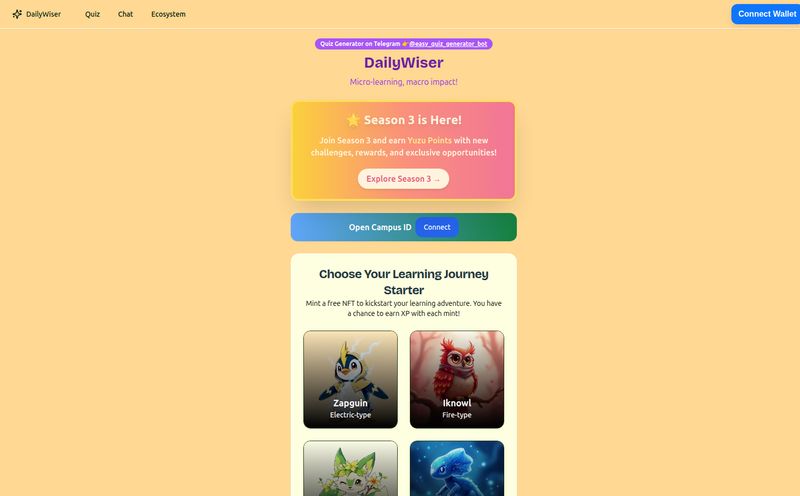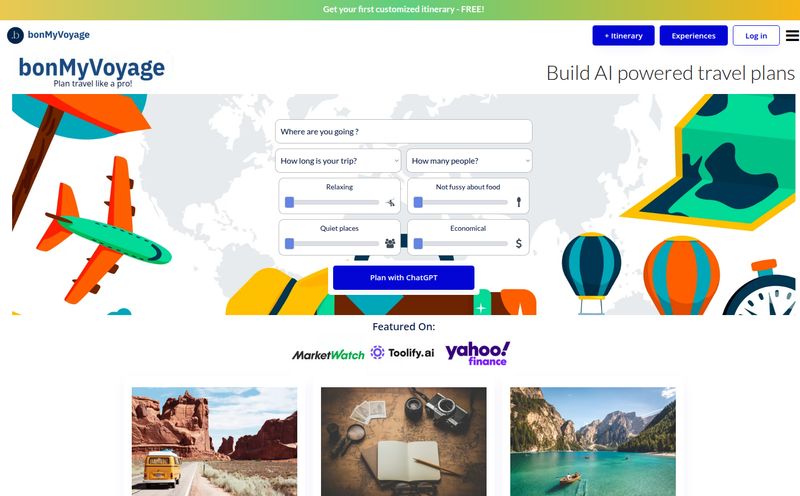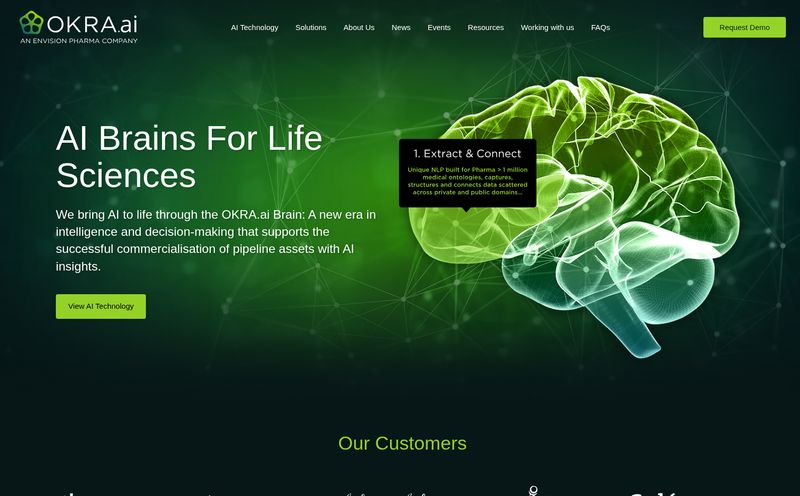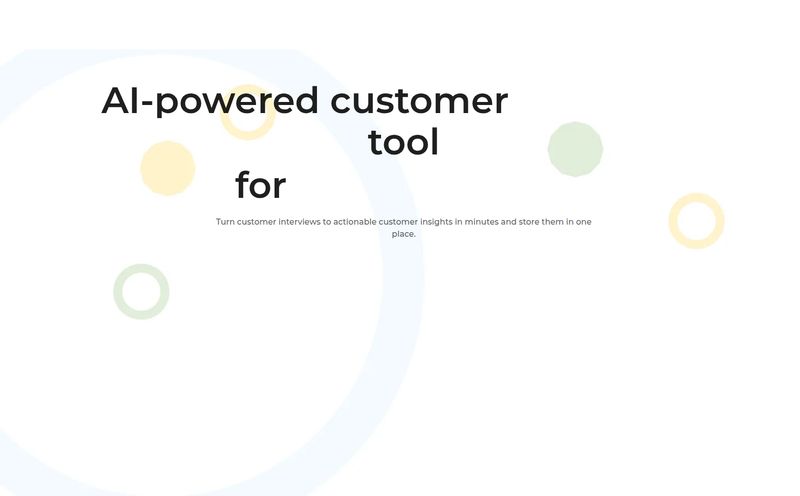If you’re in strategy or investment, a huge chunk of your life is spent on work that feels... well, like a grind. The endless research, the late-night data pulls, the soul-crushing task of turning a mountain of information into a coherent PowerPoint deck or a compelling investment memo. We’ve all been there, staring at a blank screen at 2 AM, fueled by lukewarm coffee and the sheer terror of a deadline.
The AI hype train promised to save us from this, right? And for some things, tools like ChatGPT have been a godsend for drafting emails or summarizing articles. But when you ask it to create a go-to-market strategy or a due diligence report? The results are often… generic. Fluffy. They lack the specific, hardened edge that comes from real industry knowledge.
So when I came across a platform called Mool, which claims to be an "intelligent workspace built for smart work," specifically for strategy and investment professionals, my curiosity was piqued. Another AI tool, sure. But one that speaks our language? Now that’s interesting. Let’s see if it’s just another drop in the bucket or something genuinely different.
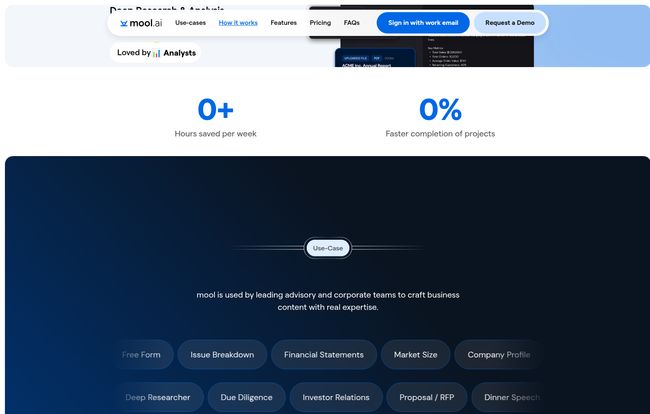
Visit Mool
What on Earth is Mool, Anyway?
At its core, Mool isn't trying to be another do-everything AI assistant. And thank goodness for that. Its mission is laser-focused. According to their own materials, Mool is an "AI-native workspace" that helps you get days of work done in minutes. How? By combining three key things: specialized templates, AI-powered reasoning, and access to unique data sources.
Think of it this way. ChatGPT is like a brilliant liberal arts major. It can write a poem, explain quantum physics in simple terms, and debate philosophy. Mool, on the other hand, is like a seasoned MBA grad who spent a decade at a top-tier consulting firm. It doesn’t just retrieve information; it understands the context of a proposal, an M&A strategy, or an investor relations update. It knows what a good one looks like because it’s been trained specifically for these high-stakes tasks.
Who Should Be Paying Attention?
This isn't a tool for your average blogger or social media manager. Mool is aiming squarely at a specific crowd of people who live and breathe high-finance and corporate strategy. This includes:
- Investment Professionals: Think venture capital and private equity firms who need to conduct deep research and due diligence, fast.
- Corporate Strategy Teams: In-house teams at large corporations tasked with everything from GTM (Go-to-Market) strategies to M&A analysis.
- Advisors and Consultants: The road warriors who need to craft compelling proposals (RFPs) and deliver insightful reports to demanding clients.
Basically, if your job involves creating documents that could decide the fate of a multi-million dollar deal, Mool wants to be your new best friend.
How Mool Actually Changes Your Workflow
The big promise is turning "days of work into minutes." It's a bold claim, one I've heard a thousand times before. But the approach here feels more grounded. It’s not about magic; it's about intelligent automation of the most time-consuming parts of the job.
The real game-changer seems to be the blend of specialized templates and AI reasoning. Instead of starting with a blank page and trying to prompt a general AI into submission, you start with a framework that already understands your goal. Need to run a deep dive on a competitor? There’s a template for that. Preparing for an investor relations call? There's a structure for that, too.
The AI then acts as your research assistant, populating these templates not just with data, but with insights. It’s a subtle but massive difference. It's the difference between getting a list of a company's press releases and getting a synthesized summary of their strategic shifts over the last three years. This frees you up to do what humans do best: the high-level thinking, the critical analysis, and the final strategic sign-off. You become the editor and strategist, not the grunt data-gatherer.
I’ve always felt the real bottleneck isn’t finding data, it’s synthesizing it into a compelling narrative. Mool seems to tackle that bottleneck head-on. It's like having that brilliant junior analyst who is incredibly fast and has read everything, ready to hand you a first draft that's already 80% of the way there.
The Good, The Bad, and The... Well, We'll See
No tool is perfect, and from my initial analysis, Mool has a clear set of strengths and a few areas where you might want to pause and consider.
The Upsides
The most obvious advantage is speed. Shaving days off a research project is no small thing. That’s more time for client-facing activities, more time for strategic thinking, or maybe, just maybe, a bit more time for sleep. The efficiency gain is the primary selling point. Secondly, the specialization is huge. The fact that its models and user experience are fine-tuned for strategy use-cases means the output should be significantly more relevant and higher quality than a generalist AI. It's a rifle, not a shotgun.
Potential Hurdles to Consider
On the flip side, this is a tool built for profesionals. This means you likely need a solid grasp of strategy and investment concepts to really make it sing. If you don't know what good due diligence looks like, an AI-generated report might not be as helpful. It’s a force multiplier, not a replacement for expertise. There's also the question of AI customization. For power users who love to tinker with every variable, a platform with its own ingrained "reasoning" might feel a bit restrictive at times. We'll have to see how much control users get under the hood.
So, What's the Price Tag on This Magic?
Alright, let's talk turkey. I clicked around, eager to find the pricing page to see what an investment in Mool looks like. And... I hit a "Page Not Found."
Yep, a classic 404 error. Before you close the tab, this isn't necessarily a bad sign. It's actually pretty common for a platform in its earlier stages. Digging into their FAQ confirmed it: they are still finalizing the pricing plans. What we do know is the structure they're planning:
| Plan | Intended For | Key Features Mentioned |
|---|---|---|
| Team | Small project teams | GTM, Execution, Strategy |
| Growth | Growing VC & PE firms | Advanced features, Global Sourcing |
| Enterprise | Global corporations & advisory firms | Customized solutions, Enhanced DD |
They're currently running a waitlist for an "early adopter program." Honestly, for a tool this specialized, getting in early could be a massive advantage. You get to shape the product and likely lock in a favorable rate before it goes mainstream. It’s a smart move if you're serious about this space.
Frequently Asked Questions About Mool AI
What exactly is Mool AI?
Mool is a specialized AI-powered workspace designed for strategy and investment professionals. It uses pre-built templates and an advanced reasoning engine to help you create complex documents like market analyses, due diligence reports, and business strategies much faster than traditional methods.
How is Mool different from ChatGPT or Microsoft Copilot?
The main difference is specialization. While ChatGPT is a general-purpose AI, Mool is vertically-specialized. Its AI models, data sources, and templates are all fine-tuned for the world of business strategy and investment. This focus results in output that is far more relevant and higher quality for these specific tasks.
How much does Mool cost?
As of right now, Mool has not released its official pricing. They are still finalizing their plans. However, they have outlined three tiers (Team, Growth, and Enterprise) and are offering a waitlist for an early adopter program.
Is Mool suitable for freelancers or just large firms?
Based on their planned tiers, it looks like they're aiming to cater to a range of users. The "Team" plan is explicitly for "small project teams," which could certainly include boutique consultancies or even highly-focused individual advisors. The "Enterprise" plan is clearly for larger organizations.
What kind of data sources does Mool use?
The platform mentions access to "unique data sources" in addition to its AI reasoning. While the specifics aren't public, for a tool in this space, this could include proprietary market data, financial databases, and specialized industry reports that aren't readily available through a standard web search.
My Final Thoughts on Mool
In a sea of AI me-too products, Mool stands out by choosing a very specific hill to die on: the complex, document-heavy world of strategy and finance. It’s not trying to do everything for everyone. It's trying to do a few very difficult things exceptionally well for a very specific audience. And I respect that.
Will it truly turn days of work into minutes? The proof will be in the pudding. But the approach is sound, the focus is right, and the problem it’s trying to solve is painfully real for a lot of high-value professionals. If you're one of those people drowning in research and reporting, keeping an eye on Mool and maybe even hopping on that early adopter waitlist... well, it could be a very smart strategic move.
Reference and Sources
For more information directly from the source, you can visit the official Mool website:
